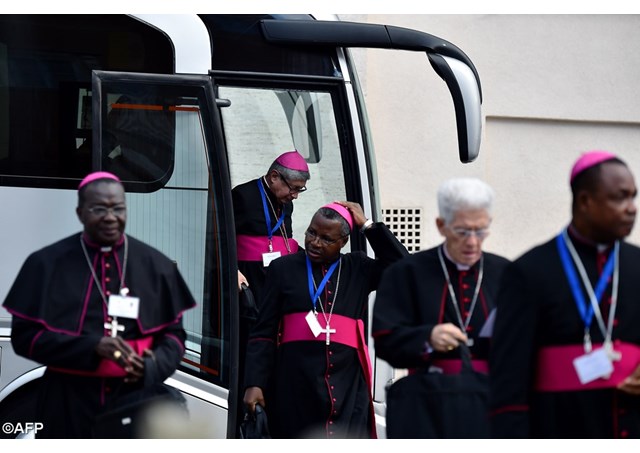
Synod on the Family: Press Briefing Day 12

(Vatican Radio) Monday 19 Oct. Archbishops Enrico Solmi of Italy, Mark Coleridge of Australia and the Latin Patriarch of Jerusalem, Beatitude Fouad Twal, answered questions from the media at the daily press briefing on the Synod of the Family. Fr. Federico Lombardi, SJ, explained that the delegates were meeting in small groups on Monday and Tuesday so there will be no report until Wednesday of the discussions that were underway. The three prelates answered a number of questions - mainly focussed on the admission of the divorced and civilly remarried to Communion.
Click below to listen to the report by Fr. Russell Pollitt SJ
“Discernment is always messy and uncertain,” said Archbishop Coleridge. He went on to say that despite the mess and the challenges the Synod faces, he is confident that deep down something is moving. Coleridge said that he thought Pope Francis’ address at the celebration of 50 years of the institution of the Synod on Saturday was a key moment and that he hoped what the Pope said would be taken forward.
Archbishop Solmi said that climate at the Synod was one of listening and expressing things openly which included different opinions and nuances. He said that a fundamental aspect of the Synod was to try and look at the family through the eyes of God. Solmi said that he really thinks the Synod understands a sense of Catholicism – the universal Church meeting and sharing their lived experiences from all over the world.
All three prelates spoke of the importance of being in touch with human experience. Coleridge said that often bishops can indulge in "Church-speak" that is truly beautiful but abstract and doesn’t touch people in their reality. He underlined that this was a pastoral synod. We need theology but we also need to be deeply in touch with human experience, he added.
Beatitude Twal, speaking on the admission of the divorced and civilly married to Communion, said that this is a very serious and complicated discussion. He said that in no way can we generalise, sometimes there may be no sin but “a lack of order” and so we have to look at these issues very closely. Coleridge said that if a second marriage is good, stable and the children were well cared for, then we need to see if there is some pastoral solution that can be used. He added that there are many people who are alienated from the Church and so it’s important that we go to them and reach out.
Solmi said that people may be living in a situation that is not God’s will for them. He said that there may be sin but we need to remember that we are dealing with the reality of peoples lives and that accompanying them means listening and embarking upon a path of discernment.
The prelates were asked how they are dealing with three vexed questions which seem to be central to the narrative around the Synod: the admission of the divorce and civilly remarried to communion, homosexuality and cohabitation. Twal said that he did not believe these were central. He said that these were not the items of the Synod but amongst items being discussed at the Synod. He mentioned other issues like war and poverty. He said that even with much goodwill on the part of the Synod delegates, they are aware of their limits and that they cannot solve all the issues before them. He said that in his part of the world he does not have the same problems as the West.
Coleridge said that there will be no substantial change in Church teaching on these issues. He said that, hopefully, there will be a movement to a new, genuine, pastoral approach to things. He said the approach requires new language, a language that listens. He said that although the Church may understand a certain language – like “love the sinner but not the sin” or “intrinsically disordered” – this no longer communicates with the people of our times. It would be helpful to find others words to express truths that are more positive. He asked if there was another way, for example, that the Church could express “indissolubility” more positively.
The bishops said that they were working hard, and feeling tired, trying to put together a report that could be presented to the Pope. They said that they would give their recommendations to him but that, in the end, the Holy Father will decide on the way forward.
| All the contents on this site are copyrighted ©. |


